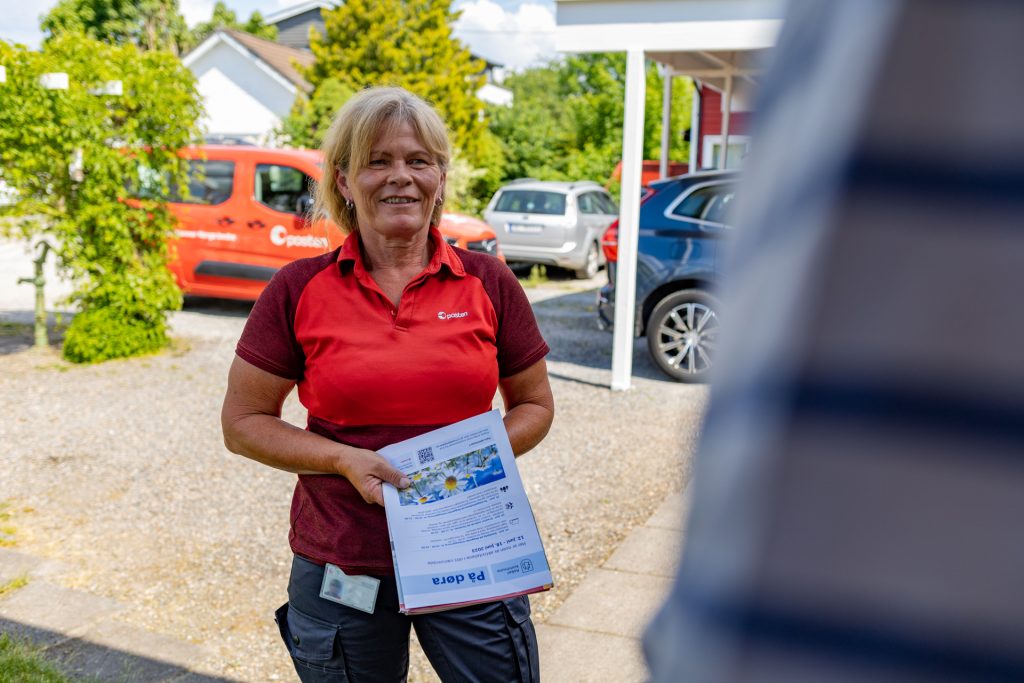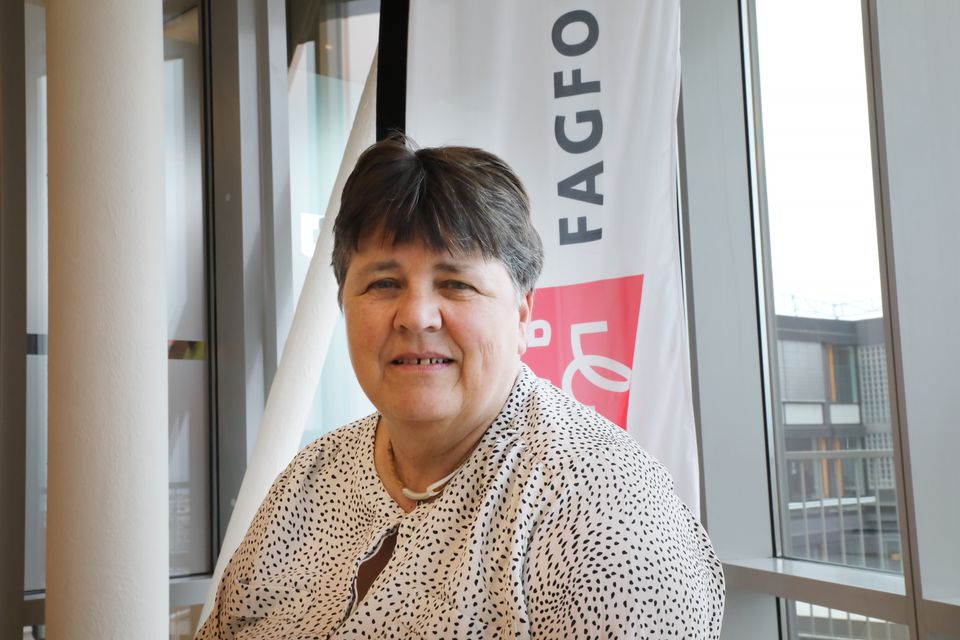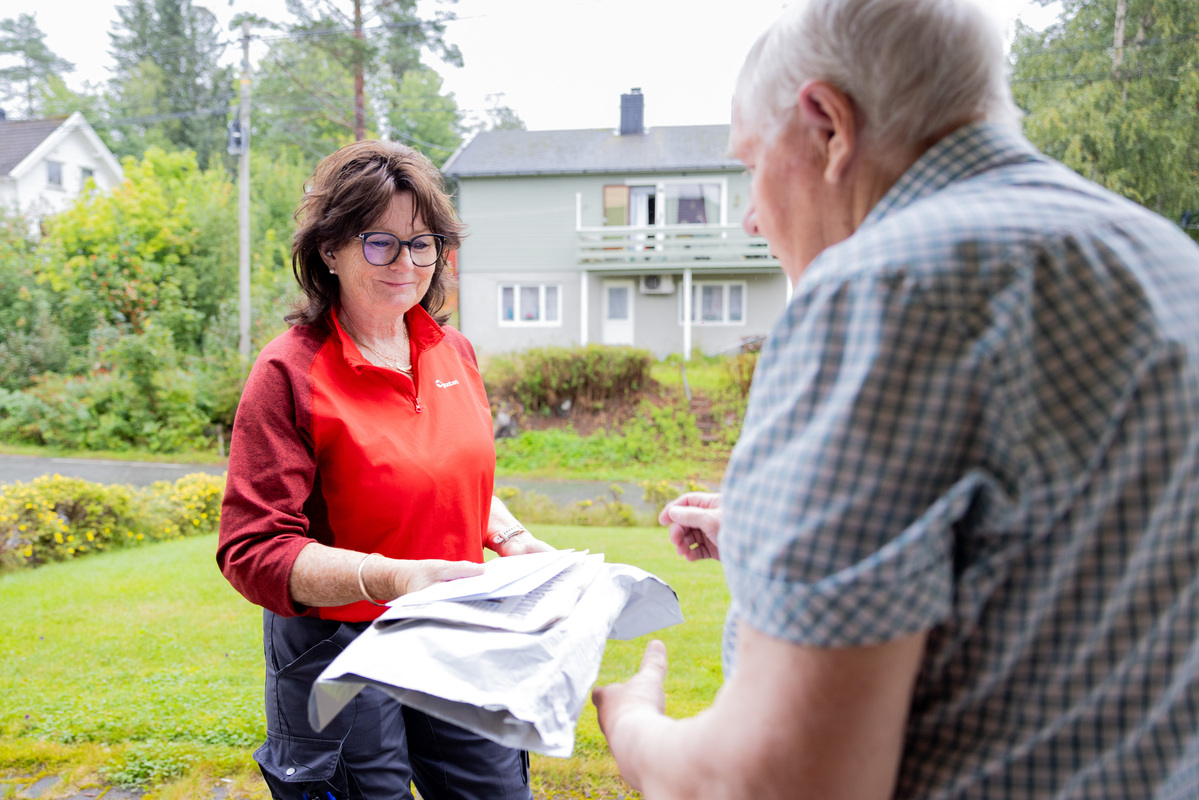Evje og Hornnes in Southern Norway’s Agder County is one of the pilot municipalities for the “På dørterskelen” project, a collaboration between Posten (the national postal service) and KS – the Norwegian Association of Local and Regional Authorities.
Every week, citizens over 67 receive an information leaflet from the municipality. Over-75s get this delivered personally at home with the rest of their mail – and with a smile from the postal worker.
This is the “På dørterskelen” project (On the Doorstep)
Senior councils in several municipalities have been in touch to say they appreciate the effects of the pilot and conclude that this is a service which is a long-awaited step in reaching older citizens with information and services.
A pilot project in eight municipalities and one district in Oslo.
Posten and KS – the Norwegian Association of Local and Regional Authorities – are collaborating on the project.
The target group is citizens above 67 and older people identified by the municipalities.
80 to 90 per cent of respondents to a survey say they read the information leaflet from the municipality every week.
35 to 40 per cent say they have participated in local activities that they learned about through the service.
Nearly all respondents say they consider information received from the municipality, police and other public bodies as useful and relevant to them.
(Source: Posten)
The project became an opportunity for the municipality to reach older citizens who are not digitally literate.
“The municipality has websites and we use social media, but we don’t reach everyone this way. “På dørterskelen” allows us to reach especially older people with information without it involving too much work for us,” says Astrid Louise Andersen, head of service, communication and digitalisation in Evje og Hornnes.
Gets older people out the door
The information leaflet includes one page listing activities which they can join the following week, and one page with other information from the municipality or other public bodies or organisations.

A survey shows that 80 to 90 per cent of recipients read the information leaflet from the municipality every week, and 35 to 40 per cent have participated in activities they learned about through this offer.
The project has also proven to be an effective tool to recruit people to the voluntary sector. When people are asked in person a couple of times a year, many sign up.
A meeting between people
The Evje og Hornes municipal senior council praises the service and has sent a letter of thanks, and several people say they have gained more social contact.
“The postal worker might be the only person to come by during the week. Many of those who get a visit live alone. We see that human contact is important to the individuals who get a visit,” says Andersen.
She believes it is important that it is the well-known postal worker who knocks and delivers the information leaflet.
“Posten as a communicator enjoys a high level of trust, perhaps especially among older people,” believes Andersen.
She underlines that the municipality does not have enough resources to do something like this on its own. It is dependent on the collaboration with Posten.
A socially valuable messenger
Several Norwegian municipalities participate in the project. The feedback has been very positive, both from postal workers, the municipalities and the older people.
The results have been very good and surprisingly similar regardless of the municipality’s size or whether it is in an urban or rural area, says Gunnar Inderberg. He is the Senior Vice President of Operational Development at Posten Norge.

In a time when the number of written letters is falling, Posten sees this as a service that can be expanded.
“Posten must adapt, and we face the same challenge as post services around the world: What do we focus on in the future? In what other ways can we be useful to society with our existing national network? We believe emergency preparedness is an obvious opportunity.
“We see that Posten’s national network of postal workers can be an important part of the solution to cover citizens’ needs before, during and after crises,” says Gunnar Inderberg.
Can reach everyone
It is estimated that roughly 600,000 people are outside of the digital society in Norway. For them, physical information can be crucial – both in everyday life and in times of crisis.
Posten’s national network is the only infrastructure that every week reaches all households physically. Inderberg believes that in a crisis, this could be crucial for conveying vital information, checking on individuals’ well-being and delivering essential goods.
Experiences from Ukraine show that national postal services can play a key role in maintaining social functions, especially those linked to delivering information and goods, as well as cash handling.
Where the infrastructure has been destroyed or it is otherwise impossible to drive to people’s homes, they have set up mobile delivery points. The Ukrainian postal service has also played a major role in distributing international aid shipments to people in need.
Posten also points to Bring in Sweden, which has established a role as a national preparedness partner for the Swedish Red Cross.

Posten can play a bigger role in Norway’s overall emergency preparedness.
“When we talk about preparedness, it often concerns supply readiness – how to provide fuel, food and transport. But equally important is how we reach citizens with information and goods when everything else fails. In Posten, we know where people live and we know how to reach them,” says Gunnar Inderberg.
Political fight for the future
With declining letter volumes, Posten is facing new changes to its letter network. Both Posten and the Norwegian Association of Local and Regional Authorities (KS) recommend establishing the doorstep service as a national public service as part of the restructuring of the letter network.
Inderberg fears that if the service is not included as part of the restructuring, it will come to nothing. When the network is finally closed down, it will be too late for regrets, as the resources and skills will be gone and impossible to reestablish.
Posten and KS wish to make the service national and permanent, ideally as a three-year full-scale pilot, before a final decision is made.
They did not, however, get support for this from the Postal Committee when it published a report in 2024 on the future of the postal service.
The Committee gave a national doorstep service the thumbs down. It was positive to the idea of having a system based on a commercial model but argued it should not be a state-funded postal service.
This sparked intense engagement and strong reactions from municipalities, organisations and trade unions. They warned against increased social exclusion and weakened emergency preparedness.
Now and not later
The Rambøll consultancy firm has evaluated “På dørterskelen” on commission from KS. KS points to the main findings in the evaluation: That “På dørterskelen” meets a genuine need, requires few resources, strengthens the work of municipalities and can help address the wider challenges facing the municipal sector.

The Confederation of Norwegian Trade Unions, LO, is also critical of the Postal Committee’s recommendations. Gerd Øiahals, the head of the Post and Finance trade union, sat on the Postal Committee.
“The doorstep service must be included. If you weaken Posten, you weaken societal security and create exclusion. Everyone who, for various reasons, cannot use digital tools must also be able to receive important information,” Øiahals says in a press release.
She believes it is important that less frequent mail delivery does not lead to staff reductions at Posten.
“If we introduce cuts now, it will not be possible to rebuild later,” argues Øiahals.
The matter is now with the government in the shape of a reform that could create new cross-sector societal benefits and strengthen emergency preparedness.





